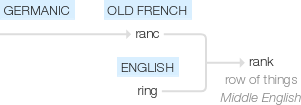Rank
Middle English (in the sense ‘row of things’): from Old French ranc, of Germanic origin; related to ring1.
wiktionary
From Middle English rank(“strong, proud”), from Old English ranc(“proud, haughty, arrogant, insolent, forward, overbearing, showy, ostentatious, splendid, bold, valiant, noble, brave, strong, full-grown, mature”), from Proto-West Germanic *rank, from Proto-Germanic *rankaz(“straight”), from Proto-Indo-European *h₃reǵ-(“straight, direct”). Cognate with Dutch rank(“slender, slim”), Low German rank(“slender, projecting, lank”), Danish rank(“straight, erect, slender”), Swedish rank(“slender, shaky, wonky”), Icelandic rakkur(“straight, slender, bold, valiant”).
From Middle English rank(“line, row”), from Old French ranc, rang, reng(“line, row, rank”) (Modern French rang), from Frankish *hring(“ring”), from Proto-Germanic *hringaz(“something bent or curved”).
Akin to Old High German (h)ring, Old Frisian hring, Old English hring, hrincg(“ring”) (Modern English ring), Old Norse hringr(“ring, circle, queue, sword; ship”). More at ring.
etymonline
rank (n.)
early 14c., "row, line, or series;" c. 1400, a row of an army, from Old French renc, ranc "row, line" (Modern French rang), from Frankish *hring or some other Germanic source (compare Old High German hring "circle, ring"), from Proto-Germanic *hringaz "circle, ring, something curved" (from nasalized form of PIE root *sker- (2) "to turn, bend").
Meaning "a social division, class of persons" is from early 15c. Meaning "high status or position in society" is from early 15c. Meaning "a relative position" is from c. 1600. Sense of "one of the rows of squares across a chess board" is by 1570s. Military ranks "the body of private soldiers" is attested by 1809.
rank (adj.)
Old English ranc "proud, overbearing, haughty, showy," senses now obsolete, from Proto-Germanic *rankaz (source also of Danish rank "right, upright," German rank "slender," Old Norse rakkr "straight, erect"), which is of uncertain origin, possibly related to Old Norse and Old English rinc "man, warrior." Related: Rankly; rankness.
In reference to plant growth, "vigorous, luxuriant, abundant, copious" (also figurative) it is recorded from c. 1300. The sense also evolved in Middle English to "large and coarse" (c. 1300), then to "corrupt, loathsome, foul" (mid-14c.), perhaps via the notion of "excessive and unpleasant," perhaps also influenced in this by French rance "rancid." Specifically as "having an offensive, strong smell" by 1520s. In Middle English also "brave, stout-hearted; splendid, admirable." In 17c. it also could mean "lewd, lustful."
The development of the word in Eng. is, however, far from clear, as the OE. uses are not quite the primitive ones. In ME. also it chiefly occurs in alliterative verse, app. more for convenience than to express definite meanings. In the later language the chief difficulty is to decide which of the more original senses are represented in the transferred uses. [OED]
Much used 16c. as a pejorative intensive (as in rank folly). This is possibly the source of the verb meanings "to reveal another's guilt" (1929, underworld slang) and that of "to harass, insult, abuse," 1934, African-American vernacular, though this also may be so called from the role of the activity in establishing social hierarchy (and thus from rank (n.)).
rank (v.)
1570s, "arrange in lines;" 1590s, "put in order, classify; assign a rank to," also "have a certain place in a hierarchy," from rank (n.). The meaning "outrank, take precedence over" is by 1841. Related: Ranked; ranking. An earlier verb ranken (mid-13c.) "to fester, suppurate" is from rank (adj.).
